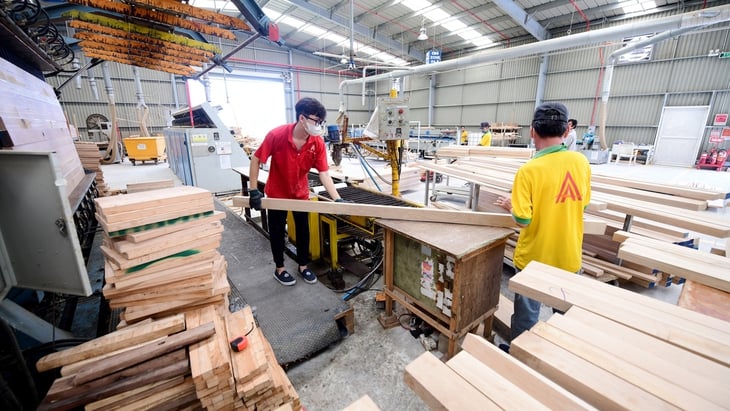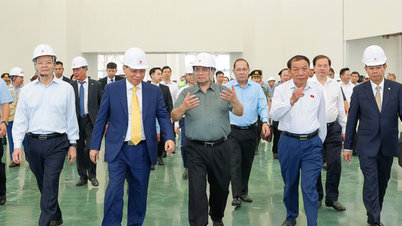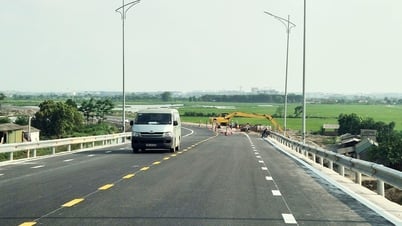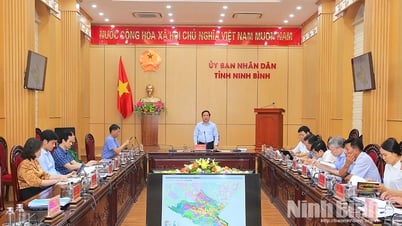
There will be a series of policies to support private enterprise development - Photo: Q. DINH
Many delegates support policies to support private enterprise development but suggest considering regulations to inspect and examine enterprises no more than once a year, while policies to support loans, land, etc. must ensure feasibility and effectiveness.
On the afternoon of May 15, the National Assembly discussed in groups after the Government submitted a draft resolution of the National Assembly on mechanisms and policies for private economic development.
Will it be difficult to manage to inspect and check businesses once a year?
Minister of Finance Nguyen Van Thang said that to achieve the goal of having at least 20 large enterprises participating in the global value chain by 2030, the draft proposes two groups of policies. The first group of policies places orders, conducts limited bidding, and appoints contractors to implement key and important national projects. The second group of policies supports the formation and development of medium and large enterprises and private economic groups of regional and global stature.
The Resolution also provides a series of policies to support businesses in accessing land, production and business premises, tax support and public procurement, support for renting houses and land that are public assets. Financial and credit support such as the Small and Medium Enterprise Development Fund providing loans to small and medium enterprises; start-up loans; incentives in contractor selection; support for science , technology and innovation, digital transformation, and human resource training.
In particular, the number of inspections for each enterprise, business household, and individual business must not exceed once a year, except in cases where there are clear signs of violations. Prioritize remote inspections based on electronic data, reduce direct inspections. Exempt from inspections if enterprises and business households comply with legal regulations; strongly shift from pre-inspection to post-inspection.
Delegate Pham Khanh Phong Lan (HCMC) said that building special, breakthrough policies for private economic development is very necessary, but policy mechanisms need to be carefully considered to properly meet the support needs of private enterprise development.
Affirming that she "disagrees with the fact that inspections are corrupt, negative, and affect the business environment", Ms. Lan said that the effectiveness of inspection activities should not be eliminated because of a negative group.
"If we only use the inspection plan once a year, it will be very difficult to achieve the effectiveness of the inspection activities. Especially in the context of the increasingly complicated situation of smuggled goods, counterfeit goods, and poor quality goods," Ms. Lan said, suggesting that inspection regulations be seriously considered to both comply with the law and ensure that they do not affect the business activities of enterprises.
According to Ms. Lan, the obstacles preventing private enterprises from developing adequately are due to many reasons, such as limited access to capital, land resources, interest rate support, administrative procedures, etc. Enterprises and individuals doing business honestly are besieged and devalued by fake, counterfeit, and poor quality goods. "If we do not step up inspections to eliminate "weeds", how can "barley" develop?", Ms. Lan said.
There must be a mechanism to prevent businesses from taking advantage.
Delegate Tran Quoc Tuan (Tra Vinh) said that the regulation that inspection and examination of each enterprise, business household, and individual business must not be more than once a year, except in cases where there is clear evidence of violations, is completely consistent with the Party and State's policy to create conditions for the private economy to develop more strongly. However, if the regulations are not clear, it will create a legal gap that can be easily exploited.
Therefore, Mr. Tuan believes that legal regulations need to be designed tightly and transparently in a way that provides special support to create maximum convenience for private enterprises. Therefore, it is necessary to supplement the coordination mechanism between the inspection and examination agencies and other relevant agencies to ensure that inspection and examination are not more than once a year but are effective, helping to prevent the possibility of some dishonest enterprises taking advantage to violate the law.
Meanwhile, delegate Ha Sy Dong (Quang Tri) proposed to add a regulation that during the inspection process, state agencies are not allowed to ask enterprises to present documents issued by the agency itself, documents that have been published or updated on national databases that the agency has access to, in order to help promote e-Government, and state agencies are required to use electronic databases.
"Many things have been digitized, but state agencies still demand paper copies," Mr. Dong said, suggesting that there be regulations allowing businesses to cite similar cases with previous conclusions from competent state agencies to protect their rights.
If the state agency decides differently from the previous case, it is necessary to clearly explain the reasons to avoid arbitrariness in the inspection, examination and licensing process.
Discussing in the group, Deputy Prime Minister Ho Duc Phoc wondered if the inspection was only carried out once a year, "whether it would be sufficient", especially when there were areas related to food safety, fire prevention, urgent issues... that could expose loopholes. Therefore, he suggested considering this content to assign the Government to make appropriate and detailed regulations depending on each industry and field.
In addition, violations discovered during inspections must be strictly handled, even criminally handled for serious and systematic violations... According to Mr. Phuc, the regulation of exempting enterprises from actual inspections that comply with the law also needs to be carefully considered because state management agencies do not know whether enterprises comply with the law or not and can only be inspected when there are signs of violations.
- Mr. LE QUAN (Director of Hanoi National University):
There needs to be a specific mechanism for bankrupt businesses.

The private sector needs a mechanism to access resources and a mechanism to go bankrupt. Out of 10 start-up businesses, 3/4 are likely to go bankrupt after 5 years. But with the current difficult and complicated bankruptcy procedures, businesses cannot go bankrupt, it is difficult to resolve related issues, so entrepreneurs have little chance to start over.
There should be a mechanism for bidding, prioritizing key projects and science and technology projects, and should not be limited to small and medium enterprises. These enterprises have limited resources, so even if they have good science and technology solutions, it is difficult for them to participate in bidding. Therefore, there should be policies to support research, piloting, and placing orders with small and medium enterprises.
Regarding the leasing of public assets with land, it is necessary to assign them to local authorities, the subjects of leasing public assets should be expanded, the Government should guide and should not limit. The most existing public assets are public service units and state-owned enterprises, if there is this mechanism, cooperation in exploitation will be better. Public assets are not only land, facilities but also science and technology platforms, digital platforms, equipment, intellectual property to help transfer better.
Therefore, this resolution needs the Government to guide specific mechanisms in cooperation in exploiting public assets, meeting the implementation of innovation projects.
- Mr. TA DINH THI (Vice Chairman of the Committee on Science, Technology and Environment):
Simplify business formation

To achieve the target of 2 million enterprises, policies need to focus on reviewing regulations, cutting administrative procedures, simplifying business establishment and licensing processes. The draft does not fully address this and needs further research. Special attention needs to be paid to the establishment of innovative startups and universities.
Regulations on participation in public bidding, there are preferential regulations but need to be studied more widely. Support funds for small and medium enterprises also need to be considered, but localities can establish funds to support local private enterprises in addition to the central fund. Because there is no practical support for small and medium enterprises, a fund to support local private enterprises is necessary.
- Mr. NGUYEN MINH DUC (Deputy Chairman of the Committee on National Defense - Security and Foreign Affairs):
Scan each area to find bottlenecks

To institutionalize the entire Resolution 68 of the Politburo (on the private economy), the authorities must gather and examine the regulations in each field to see what is wrong, what are the bottlenecks and barriers that lead to the lack of equality between the private economy and the state economy in all investment activities in all fields.
We understand that each law has regulations for different types of business, each type has regulations on principles, procedures, taxes... So what are the problems and bottlenecks that need to be carefully considered? Without a summary of the bottlenecks, bottlenecks, and inequalities in this field, the resolution has not resolved the goals set out in Resolution 68.
Should increase tax exemption and reduction period for businesses
Regarding policies to support businesses, Deputy Prime Minister Ho Duc Phoc expressed concerns about the feasibility of the small and medium enterprise development fund, saying that there is no mechanism to collect money when there is collateral, if there is no collateral. "In fact, commercial banks that lend against collateral cannot collect money," said Mr. Phoc, adding that the fund needs to support businesses such as technology transfer, staff training, attracting high technology, and site clearance, etc.

According to delegates, legal regulations need to be designed tightly and transparently in a direction of special support to create maximum convenience for private enterprises - Photo: HA QUAN
According to delegate Tran Kim Yen (HCMC), for businesses, the most important thing is equality in business. Equality in access to capital, administrative procedures, support policies... to create fair competition between businesses. Because in reality, there are backyard businesses with unfair competition practices that become a huge obstacle for new, large businesses.
"Therefore, in my opinion, the chapter on improving the business environment should be changed to a chapter on creating an equal business environment, reducing harassment and inconvenience for businesses. In fact, the recent inspections and checks have been reported by businesses as the most troublesome. Specific regulations in the resolution can create a transparent environment for businesses to develop properly, stimulating the private economy," Ms. Yen said.
According to Ms. Yen, the policy on supporting access to land resources and business premises, although there are some laws regulating this, in reality it is very difficult for businesses to access. "Through monitoring in Ho Chi Minh City, there are many vacant and abandoned public real estate properties, but it is very difficult for businesses to rent them. Therefore, it is necessary to have more detailed and specific regulations on support and leasing standards... Otherwise, it will be very difficult to implement this policy," Ms. Yen suggested.
Meanwhile, Chairman of the Board of Directors of Dabaco Group Nguyen Nhu So (Bac Ninh) said that if only exempting corporate income tax for 2 years and reducing 50% of tax for the next 4 years as in the draft law is too short compared to the development cycle of innovative startups, he proposed to increase the tax exemption period to 5 years, continuing to reduce 50% of tax payable for the next 5 years to create a "financial space" long enough for this group of businesses.
According to Mr. So, it is necessary to add provisions on supporting costs for registration and protection of intellectual property rights, shortening the time for processing related procedures. In fact, many countries have specific support policies, Singapore supports up to 70% of the cost of registering international intellectual property rights, up to 20,000 SGD/enterprise/market. Through the IP center system, since 2009, Korea has supported more than 11,000 small and medium enterprises in registering, protecting and handling intellectual property disputes.
Source: https://tuoitre.vn/thanh-tra-kiem-tra-doanh-nghiep-1-lan-nam-tao-thuan-loi-nhung-khong-de-bi-loi-dung-2025051523161516.htm


![[Photo] Close-up of Tang Long Bridge, Thu Duc City after repairing rutting](https://vphoto.vietnam.vn/thumb/1200x675/vietnam/resource/IMAGE/2025/5/19/086736d9d11f43198f5bd8d78df9bd41)


![[Photo] President Luong Cuong presents the 40-year Party membership badge to Chief of the Office of the President Le Khanh Hai](https://vphoto.vietnam.vn/thumb/1200x675/vietnam/resource/IMAGE/2025/5/19/a22bc55dd7bf4a2ab7e3958d32282c15)
![[Photo] Panorama of the Opening Ceremony of the 43rd Nhan Dan Newspaper National Table Tennis Championship](https://vphoto.vietnam.vn/thumb/1200x675/vietnam/resource/IMAGE/2025/5/19/5e22950340b941309280448198bcf1d9)
![[Photo] General Secretary To Lam attends the conference to review 10 years of implementing Directive No. 05 of the Politburo and evaluate the results of implementing Regulation No. 09 of the Central Public Security Party Committee.](https://vphoto.vietnam.vn/thumb/1200x675/vietnam/resource/IMAGE/2025/5/19/2f44458c655a4403acd7929dbbfa5039)



















![[Photo] Prime Minister Pham Minh Chinh inspects the progress of the National Exhibition and Fair Center project](https://vphoto.vietnam.vn/thumb/1200x675/vietnam/resource/IMAGE/2025/5/19/35189ac8807140d897ad2b7d2583fbae)



























































![[VIDEO] - Enhancing the value of Quang Nam OCOP products through trade connections](https://vphoto.vietnam.vn/thumb/402x226/vietnam/resource/IMAGE/2025/5/17/5be5b5fff1f14914986fad159097a677)




Comment (0)